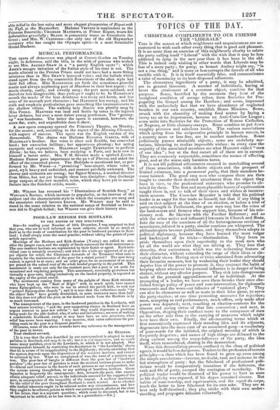POOR-LAW REFORM FOR SCOTLAND.
TO THE EDITOR OF THE SPECTATOR.
Sin—In reading your Number of 10th December, I was surprised to find that you, who are so well informed on most subjects, should be so much at fault as to the mode of contribution for the poor in landward parishes in Scot • land : 1 shall simply state the usual practice, without taking the points of your article separatim. Meetings of the Heritors and Kirk-Session (Vestry) are called to con- sider the pauper cases, and the supply of funds necessary for their maintenance. The non-resident heritors are represented by their factor or agent. Each indi- vidual case is minutely examined; and when the whole are approved of as pro- per objects for relief, the Chairman demands of the Treasurer what sum is requisite for the maintenance of the poor for a stated period ? The sum being named, is agreed to at once; and an order given for an assessment of so much per pound on the valued rent of the whole landed property in the parish. This assessment is made not only for the resident poor, but a part is set aside for occasional and wayfaring paupers. This assessment, nominally gratuitous but virtually a poor-rate, falling exclusively on the landed property, is repeated at the expiry of the period stated. The sentiments coming from many of the pulpits of those Kirk ministers who have kept up the " Reel of Bogie" with so much spirit, have caused many Episcopalians, who were in use to attend the parish kirk, to seek out " genteel Episcopalian chapels"; and it is true that the collections made " by the elders' ladle" have greatly diminished, in some instances more than half: but this does not affect the poor, as the demand made from the Heritors is by so much increased.
The management of the poor, in the landward parishes in the Lowlands, will bear minute scrutiny ; " and the poor-supporting classes in Scotland have an urgent interest in poor-law reform ": but they would deprecate a provision being made for the able-bodied, who, if sober and industrious, are sure of making a comfortable livelihood, except it may have been on rare occasions, when relief has never been wanting. I may mention, that extra collections for pro- viding coals to the poor is a frequent practice. Of coarse, none of the above remarks have any reference to the management of the poor in towns.
[It is true that the plan described by our correspondent is adopted in many parishes in Scotland, and may be in all; but it is not imperative, and we could name many parishes, even in the Lowlands, in which it is not adopted. Our correspondent himself, by restricting his description to " the Lowlands," shows that he is aware of its inapplicability to the Highlands ; thereby admitting that the system depends upon the dispositions of the resident heritors, and cannot be enforced by law. What we complained of was, the want of a uniform sys- tem. The poor-law of burghs is different from the poor law of "landward parishes"; the poor-law of parishes is what the resident heritors please to make it—liberal and humane in the hands of such persons as our correspondent, but the reverse among thoughtless, to say nothing of heartless, beritors. Great Injustice is frequently the consequence: first, towards the poor, who cannot obtain adequate relief; second, to the individuals assessed for the support of the poor, in consequence of the inequality of the impost. A. uniform machinery for the relief of the poor throughout Scotland is much wanted. As to whether able -bodied labourers ought to be relieved under any circumstances, and how they ought to be relieved, points to which our correspondent alludes at the close of his letter, that is a separate question ; which must be discussed, but is too important to be settled, as he has done it, in a parenthesis.—En.]






















 Previous page
Previous page